| ||||||||||||||||
| ||||||||||||||||
| ||||||||||||||||
The 1960 University of Oxford election for the position of Chancellor was called upon the death of the incumbent Chancellor, Lord Halifax, on 23 December 1959. It was the first election for Oxford Chancellor to be contested since 1925.
| ||||||||||||||||
| ||||||||||||||||
| ||||||||||||||||
The 1960 University of Oxford election for the position of Chancellor was called upon the death of the incumbent Chancellor, Lord Halifax, on 23 December 1959. It was the first election for Oxford Chancellor to be contested since 1925.
The electorate consisted of all members of the University holding the rank of Master of Arts, of which there were around 30,000 at the time. Votes had to be cast in person at Oxford in academic dress. The election was by first past the post. To stand a candidate had to be nominated by two electors.
At first, the university authorities came up with only one candidate, the wealthy Chairman of Lloyds Bank and former British Ambassador to Washington Sir Oliver Franks .
However, Hugh Trevor-Roper, installed less than three years earlier as Regius Professor of Modern History by the Prime Minister Harold Macmillan , proposed the Prime Minister as an alternative candidate. Trevor-Roper orchestrated the Macmillan campaign, writing to graduates to encourage them to travel to Oxford to vote for Macmillan.
The results were as follows:
| Candidate | Votes | % | |
|---|---|---|---|
| 1,976 | 53.8 | ||
| Sir Oliver Franks | 1,697 | 46.2 | |
| Turnout | 3,673 | ||

Maurice Harold Macmillan, 1st Earl of Stockton was a British statesman and Conservative politician who was Prime Minister of the United Kingdom from 1957 to 1963. Nicknamed "Supermac", he was known for his pragmatism, wit, and unflappability.

Hugh Redwald Trevor-Roper, Baron Dacre of Glanton, was an English historian. He was Regius Professor of Modern History at the University of Oxford.
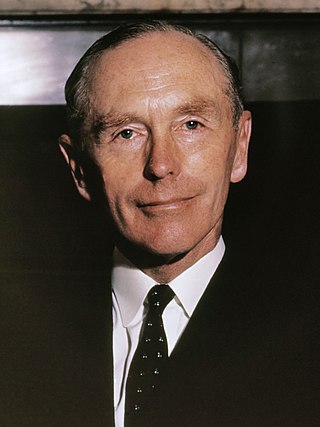
Alexander Frederick Douglas-Home, Baron Home of the Hirsel, known as Lord Dunglass from 1918 to 1951 and the Earl of Home from 1951 to 1963, was a British statesman and Conservative politician who served as Prime Minister of the United Kingdom from 1963 to 1964. He was the last prime minister to hold office while being a member of the House of Lords, before renouncing his peerage and taking up a seat in the House of Commons for the remainder of his premiership. His reputation, however, rests more on his two stints as Foreign Secretary than on his brief premiership.

Reginald Maudling was a British politician who served as Chancellor of the Exchequer from 1962 to 1964 and as Home Secretary from 1970 to 1972. From 1955 until the late 1960s, he was spoken of as a prospective Conservative leader, and he was twice seriously considered for the post; he was Edward Heath's chief rival in 1965. He also held directorships in several British financial firms.
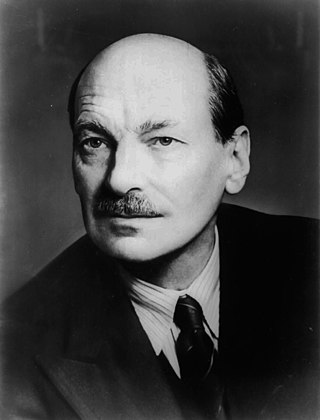
The 1945 United Kingdom general election was a national election held on Thursday 5 July 1945, but polling in some constituencies was delayed by some days, and the counting of votes was delayed until 26 July to provide time for overseas votes to be brought to Britain. The governing Conservative Party sought to maintain its position in Parliament but faced challenges from public opinion about the future of the United Kingdom in the post-war period. Prime Minister Winston Churchill proposed to call for a general election in Parliament, which passed with a majority vote less than two months after the conclusion of the Second World War in Europe.

The 1959 United Kingdom general election was held on Thursday, 8 October 1959. It marked a third consecutive victory for the ruling Conservative Party, now led by Prime Minister Harold Macmillan. For the second time in a row, the Conservatives increased their overall majority in Parliament, this time to a landslide majority of 100 seats, having gained 20 seats for a return of 365. The Labour Party, led by Hugh Gaitskell, lost 19 seats and returned 258. The Liberal Party, led by Jo Grimond, again returned only six MPs to the House of Commons, but managed to increase its overall share of the vote to 5.9%, compared to just 2.7% four years earlier.
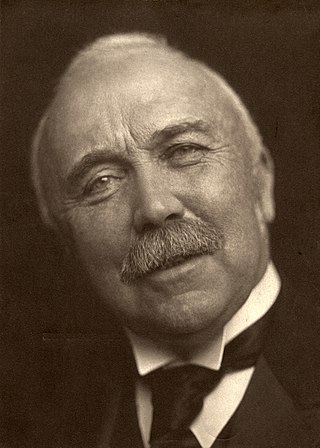
The 1906 United Kingdom general election was held from 12 January to 8 February 1906. The Liberals, led by Prime Minister Henry Campbell-Bannerman, won a landslide majority at the election. The Conservatives led by Arthur Balfour, who had been in government until the month before the election, lost more than half their seats, including party leader Balfour's own seat in Manchester East, leaving the party with its fewest recorded seats ever in history until 2024. The election saw a 5.4% swing from the Conservative Party to the Liberal Party, the largest-ever seen at the time. This has resulted in the 1906 general election being dubbed the "Liberal landslide", and is now ranked alongside the 1924, 1931, 1945, 1983, 1997, 2001, and 2024 general elections as one of the largest landslide election victories.

The 1852 United Kingdom general election was held between 7 July 1852 and 31 July 1852 to elect members of the House of Commons, the lower house of Parliament of the United Kingdom. It was a watershed in the formation of the modern political parties of Britain. Following 1852, the Tory/Conservative party became, more completely, the party of the rural aristocracy, while the Whig/Liberal party became the party of the rising urban bourgeoisie in Britain. The results of the election were extremely close in terms of the numbers of seats won by the two main parties.
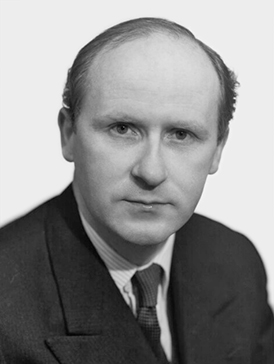
Anthony Perrinott Lysberg Barber, Baron Barber, was a British Conservative politician who served as Chancellor of the Exchequer from 1970 to 1974.

British prime minister Harold Macmillan carried out a major cabinet reshuffle of his premiership on 13 July 1962. Macmillan dismissed seven members of his Cabinet, a third of the total.
Cambridge University was a university constituency electing two members to the British House of Commons, from 1603 to 1950.
Oxford University was a university constituency electing two members to the British House of Commons, from 1603 to 1950. The last two members to represent Oxford University when it was abolished were A. P. Herbert and Arthur Salter.
The 1955 Labour Party leadership election was held following the resignation of Clement Attlee. Attlee was Prime Minister from 1945 to 1951 and stayed on as party leader until he lost the 1955 general election.
The 1963 Labour Party leadership election was held following the death of Hugh Gaitskell, party leader since 1955. He died on 18 January 1963 and was succeeded by deputy leader George Brown.
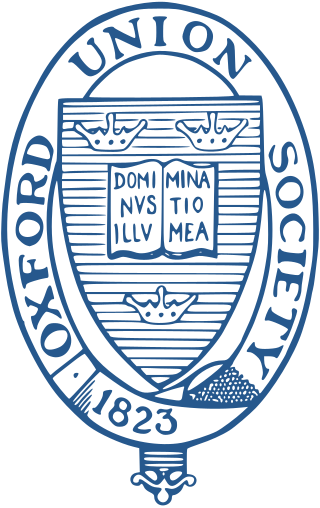
The Oxford Union Society, commonly referred to as the Oxford Union, is a debating society in the city of Oxford, England, whose membership is drawn primarily from the University of Oxford. Founded in 1823, it is one of Britain's oldest university unions and considered one of the world's most prestigious private students' societies. The Oxford Union exists independently from the university and is distinct from the Oxford University Student Union.
The 1987 University of Oxford election for the position of Chancellor was called upon the death of the incumbent Chancellor, Harold Macmillan, 1st Earl of Stockton, on 29 December 1986.
The 1890 Caernarvon Boroughs by-election was a parliamentary by-election held on 10 April 1890 for the British House of Commons constituency of Caernarvon Boroughs.
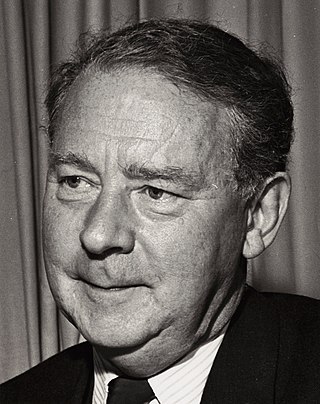
Gaitskellism was the ideology of a faction in the British Labour Party in the 1950s and early 1960s which opposed many of the economic policies of the trade unions, especially nationalisation and control of the economy.
The 1962 Stockton-on-Tees by-election was a parliamentary by-election held for the House of Commons constituency of Stockton-on-Tees in County Durham on 5 April 1962. It was the by-election at which Bill Rodgers, a future Cabinet minister and member of the "Gang of Four" of senior Labour politicians who defected to form the SDP, entered Parliament. Rodgers subsequently helped to lead the SDP into the merger that formed the Liberal Democrats, and later served as that party's leader in the House of Lords. In the circumstances it is not without irony that Rodgers remembers future Liberal leader David Steel, then not yet a Member of Parliament (MP), loudly booing the result of the election at Stockton from the floor of the count.

The 2024 University of Oxford election for the position of Chancellor became necessary upon the resignation of the incumbent Chancellor, Chris Patten. Applications for the role closed on 4 September 2024 and candidacies were announced on 16 October. More than 23,000 electors cast their votes in the first round, which took place during Third Week of Michaelmas term. This vote produced a shortlist of five candidates for the second and final round, to take place during Sixth Week of Michaelmas Term. On 27 November, William Hague was announced as the winner of the election.